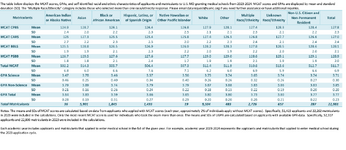Actually I was being a bit sarcastic.
Seems to be going around in this thread.
As a portion of the general population, Asians are very much over-represented in medical school admissions.
They are. But should that be the standard? If Asians are 6% of the population, then 6% of med school admissions should be Asian? Or should applicants to med schools be treated as individuals, and neither discriminated for nor against based on their race or ethnicity? The former used to a liberal value.
These charts assume--falsely--that test scores and grades are the only thing that count when determining who will make the best physician.
These charts do not assume that, and neither do I subscribe to that. Obviously there is more than academic prowess that is important in a physician. However, race and ethnicity should not be a factor. When you see markedly different grades and scores by ethnicity, that indicates that race and ethnicity play a significant role in admissions.
We can agree there. In fact, I do not think you will find anybody who disagrees.
One has to also have significant skills working as part of a team, cooperation, being able to relate to others, understanding human behavior and human psychology and other so called 'soft' skills. One must also be able to deal with high levels of stress over long periods of time, work very long, hard hours and one also must be confident and decisive.
You would have to assume that these attributes are found more frequently in blacks and less frequently in Asians for the distribution in that chart to make sense without race/ethnic discrimination. I do not think there is any reason to assume that that is the case.
The grades and test scores of black, Hispanic and Native American applicants are not mediocre. They are quite good --not markedly different than the scores of Asian or white applicants.
Actually, they are markedly different. MCAT is not scored from 0, the scale is 472-528. Mean MCAT score for Asians is 514.3, an 89th
percentile. Whites are at 512.4, somewhat lower at the 84th percentile. Blacks, on the other hand had a mean MCAT of 505.7, a 67th percentile. A huge difference. Note also that these percentiles are among all that take the test, whether or not they get into med school or even choose to apply.
Amerindians are even worse btw. Their mean MCAT is 502.2, a 54th percentile!
Another thing. The chart lists standard deviations too. For blacks, mean - sd = 499.1 or 45th percentile. That means that assuming normal distribution and using the empirical rule, ~16% of blacks getting into med school had MCAT scores below that.
I do not think how people can seriously argue that these numbers are possible without a great deal of racial discrimination.
Her GPA was perfect, her MCAT scores were excellent. She did not get into medical school.
Is she Asian?
Which was a really good thing, actually. She's a lovely person but not particularly personable or able to relate well with others, on anything other than a pretty intellectual level.
I don't know. There are specialties with less patient interaction such as pathology or radiology. And in any case, I'd rather have a brilliant doctor like Dr. House than a 499 MCAT with a great bedside manner.
Not everyone who does well academically and tests well is suited to become a medical doctor. But sometimes people pursue career paths for reasons that are not related to what they actually want or what their actual strengths are. Sometimes people do not realize exactly what 'soft' skills and personalities are suited to what kinds of careers.
Do you really think these "soft" skills are more common in blacks, Hispanics and Amerindians and less common in whites and Asians? Because you'd have to argue that if you want to use that argument to argue that racial discrimination is not the cause for the huge difference in stats for different racial and ethnic groups.
The charts also do not account for the potential to falsely reflect the applicant pool by failing to account for the number of schools any applicant applies to.
I do not even see how that would affect the data presented in the chart.

